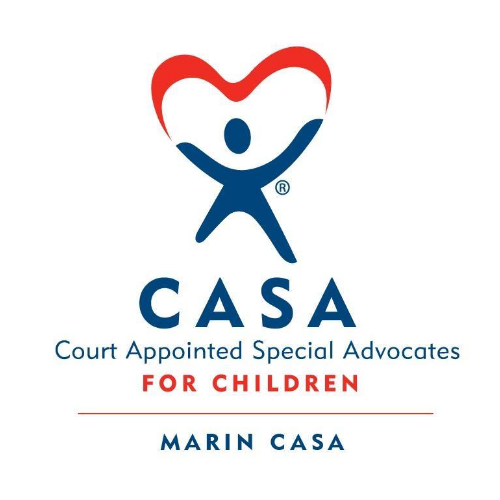Marin Court Appointed Special Advocates
Contact:
Sherene Chen
Email:
sherene@marincasa.org
Phone:
415-846-2436
“Hear from Bob about Marin CASA...”
Mission Statement
Our goal is to see every child live in a safe, permanent, and supportive home.
To reach our goal, the Marin CASA program recruits, screens, trains, and supervises volunteers who play a critical role in providing a voice for children in the courtroom. Our highly trained, court-appointed volunteers are responsible for making recommendations to the court for the safety, well-being, and a permanent home for every child assigned a Court Appointed Special Advocate (CASA).
Our CASA volunteers remain with their child from the beginning to the end of the case and advocate for their child’s fundamental needs – medical, mental health, educational, cultural, and permanent home placement. CASAs review records, research information, and talk to everyone involved in their CASA child’s life. They connect with social workers, attorneys, parents, teachers, family members, foster parents, health professionals, and, of course, the children themselves. They establish a relationship with their child, getting to know his or her unique history while providing consistency, stability, and moments of joy during an extremely difficult time in their life.
CASAS support children in the Marin County Juvenile court system – many of whom have been abused, neglected, or abandoned. Without compromise, CASAs speak up for the best interests of their children in the courtroom and in the child welfare system to ensure that they are safe, and that all their needs are met.
Community is at the heart of the Marin CASA mission. We are a community of committed volunteers, supporters, staW, and board members who are dedicated to the service of children and families in Marin. There are over 100 children in the dependency court system per year in Marin County – neighbors who are experiencing a traumatic, confusing, and chaotic time and need someone to count on as they work through the system. CASAs are consistent, caring people to count on, people who believe in the power of showing up and supporting children and families no matter what they are going through, people who speak up when needs are not met, who show up when support is needed, people who lend an ear for listening. By engaging in these intentional relationships, CASAs support healing, justice, and hope.
About Volunteer Opportunities
Describe the Tutoring or Mentoring Opportunity
Are you eager to make a difference in a child’s life? Become a CASA volunteer. When a child has an advocate, they are more likely to receive the necessary services and a permanent, stable home. As sworn officers of the court, our volunteer advocates are responsible for making recommendations for the safety, permanence, and well-being of every Marin CASA child. By building a consistent and supportive relationship with each child, Marin CASA makes a difference one child at a time. Our goal is to see every child thrive in a safe, permanent, and supportive home.
Because Every Child Deserves One Trusted Adult
In courtrooms and foster homes across Marin County, children are navigating lives disrupted by violence, abuse, and neglect. Their families are fractured. Their schools and placements change. Caseworkers and therapists come and go.
Through all of this, one person stays.
That person is a Court Appointed Special Advocate.
At Marin CASA, trained volunteers are matched with children in the dependency and juvenile justice systems. They build lasting relationships, get to know each child as an individual, and advocate for what that child needs to heal and move forward. They are often the only consistent adult in a child’s life during a time of deep uncertainty.
They are not attorneys, social workers, or clinicians. They are independent advocates who listen, connect, and speak up for the child’s well-being inside the courtroom and far beyond it.
Where does the interaction take place?
CASA volunteers see their youth at the youth’s residence or out in the community while enjoying activities together.
Volunteer Parameters
Are there any special requirements regarding age, health, mobility of volunteers?
Volunteers must complete 36 hours of training from Marin CASA staff. Volunteers must see their youth at least every other week. Volunteers must document their interactions in the CASA database. Volunteers will be assigned a skilled Case Supervisor who will guide them and must check in with their supervisor every other week.Does your vetting of volunteers include:
a. Fingerprints: Yes, a live scan is required
b. TB Test: No
c. Background check: Yes
d. Interview: Yes
e. Other: TrainingDo your volunteers need to be bilingual? How helpful would it be if they were?
Bilingual in Spanish is nice to have, but not a requirement.Is the volunteer opportunity episodic or continuous?
Continuous. CASA’s are asked to commit to at least a two-year time frame.What is the time commitment?
All CASA advocates undergo a comprehensive, 36-hour training program designed to equip anyone to be a safe and effective advocate, regardless of their past experience. CASA advocates are then expected to volunteer 8-10 hours each month to their assigned case.When does the opportunity begin and when does it end, i.e. is it tied to the academic school calendar?
The next CASA training begins Monday, October 20th. Training courses are held each fall and spring.Do you provide training for your volunteers?
All CASA advocates undergo a comprehensive, 36-hour training program designed to equip anyone to be a safe and effective advocate, regardless of their past experience. Training is broken down into the following areas: Understanding the ASA role, Communicating as a Volunteer, The dependency court process, Understanding the need and responsibility to protect families, Developing Cultural Humility, Mental health advocacy, Substance abuse, court report writing, and educational advocacy.Do you utilize teen volunteers? Would you if they were available?
CASA’s must be 21 or older.
How many volunteers does your organization currently utilize?
66
How many more would you need to have full capacity?
10
Would you increase your volunteer offerings programmatically if you had more volunteers?
If we had more volunteers, we could serve youth not just in the dependency system but in the Juvenile Justice system as well. Youth on probation and in Juvenile Hall would benefit from having a CASA advocate, as well as those in the dependency system.
What would you like potential volunteers to know in addition to the above?
Can anyone volunteer as a CASA? Yes! No special or legal background is required to volunteer. Volunteers must pass an extensive background check and are screened closely for objectivity, competence, and commitment.
How long does a CASA volunteer remain involved with a case?
A volunteer remains on the case until it is permanently resolved. One of the primary benefits of the CASA program is that, unlike other professionals who often rotate cases, the CASA is a consistent figure in the proceedings and provides continuity for the child. This is why a 2-year minimum commitment is so critical to the program.
Children in foster care and the Juvenile Court System experience abuse, neglect, and other forms of trauma. They don’t have to be alone. CASA volunteers help youth regain hope and navigate complex issues by building a meaningful relationship with a trusted adult. Research shows that children paired with CASA are more likely to find safe, permanent homes, succeed in school, and are half as likely to re-enter foster care.


